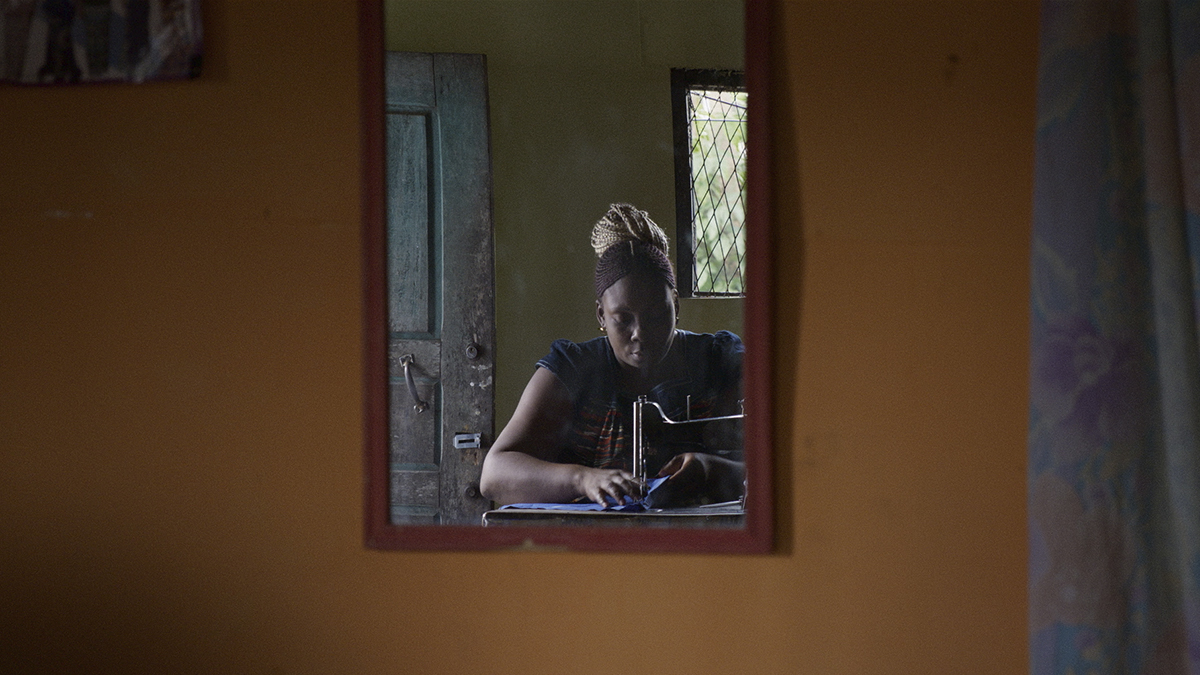by Abiba Coulibaly
Mambar Pierrette continues Roisin Mbakam’s exploration of the confessional function offered by informal businesses and the entrepreneurial African women who man them—following the thread of her previous film Chez Jolie Coiffeur (2018), about a sliver of a Belgian hair salon. Until now, Mbakam’s steady output has focused largely on the diaspora of her native Cameroon (Chez Jolie Coiffure [2018], Delphine’s Prayers [2021]) or the wider, dispersed African diaspora (Prism [2021]), and sat firmly in the category of documentary. With Mambar Pierrette she returns to her birth country for what marks a first, albeit understated, foray into fiction, as much of her naturalistic camerawork and frank perspicuity remains. This latest work takes place in a ramshackle corner of Douala, in which steadfast seamstress Mambar Pierrette (played by Pierrette Aboheu Njeuthat, Mbakam’s cousin) tends to both the intricate fabrics and tribulations of her clients, the latter of which range from contemplating sex work in exchange for a visa, to the anticipation of the arrival of a lover returning from abroad. Ground down and laughed at by the gods but continually poised, Mambar must navigate a series of her own personal setbacks. Skitting across the streets outside her workshop-cum-counselling service, Mbakam’s close ups of flip-flopped feet hopping over tropical puddles initially present as atmospheric interludes. However, an impending deluge only exacerbates Mambar load.
Though the film focuses on a personal crisis, the wider political situation and ongoing conflict in Cameroon—one revolving around demands for self-determination by Anglophone separatists from the predominantly French-speaking government—seeps in; when Mambar seeks aid in a church we hear her switch from her usual Bamileke-French blend to Pidgin English, only to be told that her plight is of secondary concern to the internally displaced population. Later, in her workshop, sheaths of vermillion cutwork lace and teal floral fabric flank Mambar’s intent face, as she listens, unamused, to an acquaintance who asks her to attend a political rally for payment. Much hinges on this dynamic—faced with destitution and desperate to support her two young children as the new school year approaches, to what extent will Mambar sell herself; to what extent will she be bought?
One scene which catalyses this predicament stands out as particularly chilling; when Mambar takes an informal motorcycle taxi and the neon green of Douala’s nightlife establishments fade out, replaced by unlit roads, she repeatedly states, “I said Dokoti“, referring to a Douala neighbourhood. Both Mambar and the viewer hope it’s a shortcut on the first ask, and by the second ask, the unnerving dilemma of racing along on a strangers’ motorbike headed to an unknown destination is paralysing. Ultimately, the outcome, though unpleasant, is not quite what we anticipate. This suspenseful moment embodies Mbakam’s ability (sharpened to uneasy perfection in Delphine’s Prayers) to render palpable gendered violence that is mundane as it is extreme, a subject matter which could easily become predatory or gratuitous in the hands of a less deft craftswoman.
This gendered adversity is ubiquitous, enforced not only by the rogue pirate taxis stalking the streets of Douala, but also within state institutions. At one point, a social worker asks Mambar, point blank, “It’s not right to stay with a man and have three children when you’re not married. Why did you never insist on getting legal status? Through ignorance?” They then proceed to spew a tired diatribe in which the present mother is blamed over the absent father.
However, Mbakam’s heroines are not victims, they are lucid and assertive, able to read their environments and endear their audiences with ease. Yet, in this film, Mambar’s spotlight is stolen towards the end by the appearance of a clown whose brief, moving monologue touches on subversive gender expression, popular justice, and the state of performing arts in Cameroon—“Art is dead in this country”, he laments, a cutting declaration and one that the film is actively resisting.. He is first introduced on the job, performing in the street, but in Mambar’s shop and presence, gaudy make-up still intact, his mask drops. His white face paint mirrors the expressionless, unsettling alabaster mannequin that guards Mambar’s shop, employed as a spectre of whiteness.
The mannequin’s arctic gaze is so disturbing that a visitor to Mambar’s shop remarks, “Your mannequin scares everyone” and proceeds to tell her how it made her mother scream during a nocturnal trip to the toilet—indicative of the shantytown’s scarce living conditions—prompting her brother to remove its head and hide the decapitated item in their kitchen, putting an end to its unwelcome surveillance. So much of Mbakam’s work is about bearing witness and looking when we might prefer to turn away, from the claustrophobic intimacy of Delphine’s Prayer, to the interrogation of the racial prejudice of lens-based technology in Prism. Involuntarily subject to the woes of her clients, Mambar grapples with these very issues herself. In a latter scene, when informed of an accident at the nearby railway, she makes the decision not to join her neighbours in going to ogle at the spectacle; while problems are continuously laid bare in her shop she opts not to go and actively search them out; after all, as one of her clients tells her, “you look like you have all of Cameroon’s cares on your shoulders.”
Abiba Coulibaly is a film programmer with a background in critical geography, interested in exploring the intersection between ethics and aesthetics.
If you enjoyed this article, please consider tipping the author and/or supporting Ultra Dogme on Patreon, Ko-fi, or Substack, so that we may continue publishing writing about film + music with love + care




